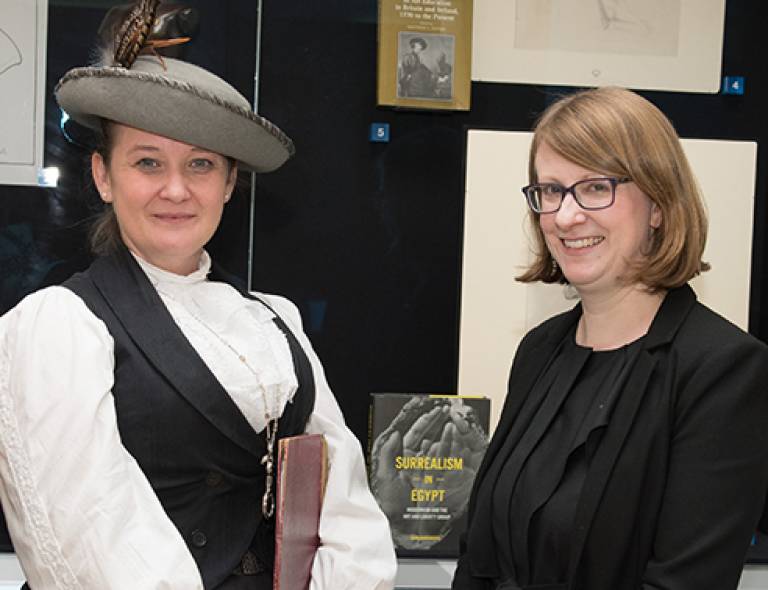Spotlight on Georgina Brewis
29 November 2018
Georgina is Associate Professor in the History of Education at UCL Institute of Education. She jointly organised the recent study day, 'Passing in’, which featured historical actor, Kate Vigurs, playing UCL Lady Superintendent, Rosa Morison (pictured, with Georgina on the right).

What is your role and what does it involve?
I am Associate Professor in the History of Education at UCL Institute of Education (IOE). I am a historian of voluntary action, youth and higher education, and my published work includes a study of what it was like to go to university in Britain over a hundred year period, and a recent update of UCL’s official history The World of UCL. I’m just finishing a book on the history of humanitarianism, co-authored with colleagues based in Sweden. I teach modules on IOE’s BA Education Studies and for UCL History department, as well as supervising PhD students across IOE, UCL History and UCL Geography – it’s very interesting to work with different departments in this way. I currently work on several externally-funded research projects – including an ESRC-funded project examining ideas about the place of voluntary organisations in welfare provision in the 1940s and 2010s. This is a big study with colleagues based at four other universities and with five non-academic partners.
How long have you been at UCL and what was your previous role?
I started at the Institute of Education at the beginning of 2011 as a postdoctoral researcher working on a Leverhulme Trust-funded project looking at secondary schooling in post Second World War London. Before that I’d spent a year or so working as a researcher in the voluntary sector after completing my PhD.
What working achievement or initiative are you most proud of?
Since 2014 I’ve been Director of a British Academy Research Project (ARP) on voluntary sector archives and records which makes connections between academics, archivists and voluntary organisations. I’ve very proud of several archive collections we have ‘saved for the nation’ through this work, as well as the practical guidance and hands-on workshops we’ve created which make a real difference. These are aimed at people with responsibility for archives and records within organisations but who may lack professional skills and training in this area. We’ve also just worked with the British Library to make a digital collection of research on volunteering available via the Social Welfare Portal, several years after it was mothballed by the charity which set it up.
Tell us about a project you are working on now which is top of your to-do list?
I’m currently researching the impact of the First World War on UK universities and students, with a focus on the ex-service men and women who returned to higher education after the Armistice. After the war, the first major UK government grant scheme for students enabled around 33,000 ex-service men to go to university or college, significantly broadening the social intake of the universities. This scheme paved the way for the rethinking of student financing, and the post-war generation shaped the international student movement in significant ways, including by founding the National Union of Students (NUS) in 1922. This research is undertaken in collaboration with Dr Daniel Laqua at the University of Northumbria, the NUS and the Workers Educational Association North East. Daniel and I have now just won a Society for Educational Studies Anniversary Award to take the research forward in 2019 and will be sharing some of these lesser known stories of the war’s legacy at a national public festival in April 2019. You can listen to my UCL Lunch Hour Lecture on the impact of the First World War on UCL here.
What is your favourite novel?
Donna Tartt’s The Secret History is one of my favourite books of all time.
What is your favourite joke (pre-watershed)?
What did the prawn do at the disco? He pulled a mussel….
Who would be your dream dinner guests?
Since working on the revisions and updates to The World of UCL, I’ve encountered some engaging characters relating to UCL’s history, which would make for a very interesting dinner. With Nina Pearlman of UCL Art Museum, I organised a study day examining gender equality at UCL since the 1860s, which featured a re-enactment of Miss Rosa Morison, Lady Superintendent of Women Students at UCL, 1883-1912. The process of turning archive research into a fully scripted, costumed character was fascinating. I’d love to meet the real Miss Morison – and perhaps go with her to the 1980s to drop in on a dinner of the ‘Academic Women’s Achievement Group’, set up by Professor Hannah Steinberg in 1979, at a time when there were just four women professors out of 123 at UCL.
What advice would you give your younger self?
Don’t think you can’t do it!
What is your favourite place?
I love living and working in London, and enjoy exploring new parts of the city now that I have two small children!
Image copyright: Natalia Janula
 Close
Close

